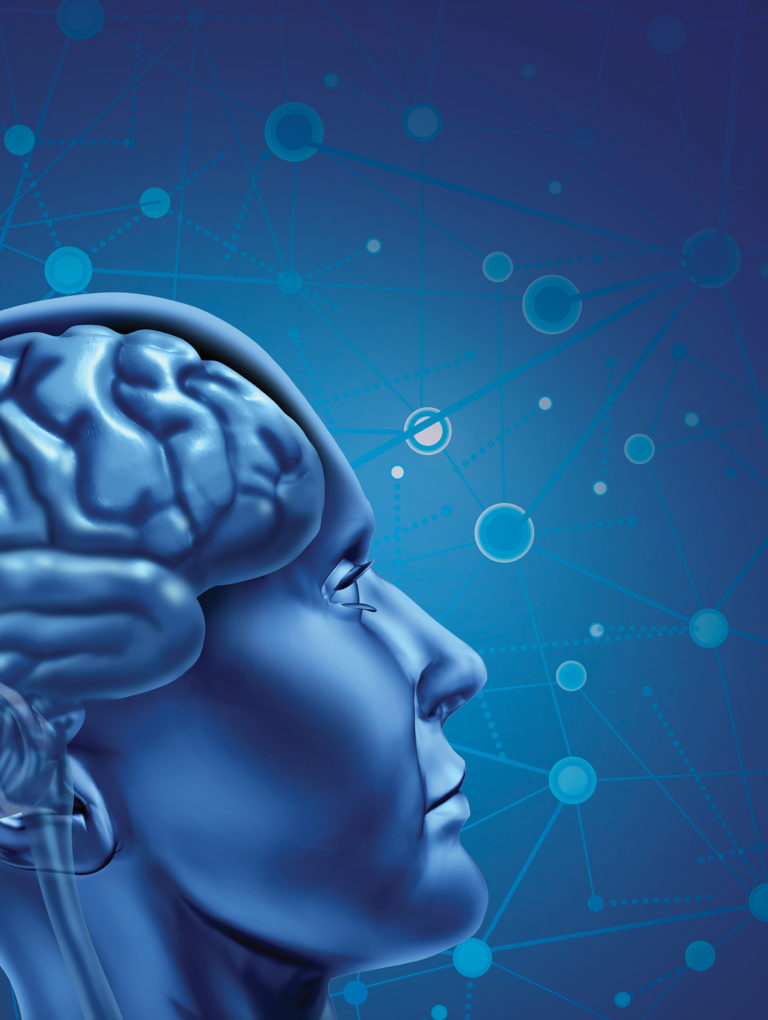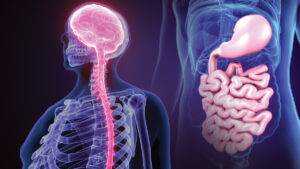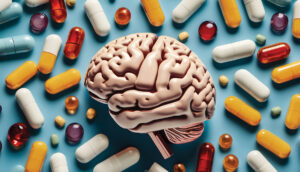Enhanced brain health starts with nutritional support.
Maintaining a mental edge as we age while having the cognitive capabilities to hang on to precious memories is something we all envision for ourselves in our golden years. Cognition is defined as conscious mental activities: the activities of thinking, understanding, learning and remembering.1 And like the rest of our body, an aging brain needs a rigorous daily workout and the proper nutrition if we want to stay “mentally sharp.”
The Centers for Disease Control and Prevention (CDC) reports that one in six (12.7 percent) adults aged 60 and older report experiencing confusion or memory loss that is happening more often or is getting worse since the past 12 months.2 Among these individuals, only 19.3 percent reported these changes to a healthcare provider, and 35. 2 percent reported difficulties due to confusion or memory loss. Changes in cognitive abilities affect individuals differently and can gradually compromise an individual’s ability to care for themselves; conduct necessary activities of daily living, such as meal preparation and money management; and effectively manage medications and existing medical conditions.3
It’s startling statistics like these that gave rise to programs such as The Healthy Brain Initiative: The Public Health Road Map for State and National Partnerships, 2013-2018, codeveloped by the CDC and The Alzheimer’s Association, which outlines how state and local public health agencies and their partners can promote cognitive functioning, address cognitive impairment for individuals living in the community, and help meet the needs of care partners. In short, the initiative was developed to combat a growing public health crisis.
Depending on where you look, of course, there are a number of foods and dietary supplements that can promote healthy cognitive function and help prevent memory loss and the onset of dementia and Alzheimer’s disease. In addition, “training the brain” to maintain or even improve cognitive abilities has also been shown to be an effective weapon against declining cognitive function.
According to the Alzheimer’s Research and Prevention Foundation, diet is critical to building a better memory and preventing Alzheimer’s and memory loss. The foundation recommends taking memory-specific vitamins such as vitamins A and C and a high potency vitamin and mineral capsule. “Dozens of memory-specific compounds have ample research behind them demonstrating their ability to support brain health, such as coenzyme Q10, alpha lipoic acid, ginko biloba, phosphatidylserine, DHA (omega-3 oil) and acetyl-L-carnitine.”
Simply put, like the commitment we make to our bodies by going to the gym on a daily basis or running that extra time, taking the time to properly “work out” our brain and feed it right is paramount for maintaining both a healthy mind and body as we age.
“Whether your memory is or isn’t what it used to be, or to sharpen the mental edge, it is now known that the brain can benefit from the right nutrition just like any other part of the body and it needs good nutrition to perform at its best,” said Jack Grogan, CN, chief science officer for Michigan-based Uckele Health & Nutrition, makers of Neuro Synergy, which optimizes neurotransmitter function and balance.
“Brain health and mental focus can be supported by formulas with the key ingredients knows to be active components in proper brain function that support optimal memory, attention and learning. Formulations that support brain health, balanced neurotransmitter levels, mental focus and physical energy may contain several ingredients.”
Neurological Imbalance
According to Grogan, netrotransmitters, or brain chemicals that relay messages across a gap called the synapse, play an essential role in everyday function. Made by the neurons from vitamin and mineral co-factors and amino acids, neurotransmitters attached to the receptor sites of neurons and can affect mood, sleep, concentration, weight and more. Grogan estimated that 86 percent of Americans have some degree of neurotransmitter deficiency or imbalance.
“Neurotransmitters communicate vital, fundamental information throughout the brain and body, such as telling the lungs to breathe, the heart to beat and the stomach to digest,” said Grogan. “They can contribute to significant negative changes when they are out of balance, such as low energy, lack of focus, weight gain, depression, irritability, insomnia and excessive sleepiness. The imbalance can be generated by a wide range of causes, such as prolonged stress, poor diet, genetic predisposition, sleep imbalances, or the overuse of alcohol, drugs or caffeine.”
Florida-based Life Extension understands this vital connection between the neurological process and the brain and offers Cognizin CDP-Choline capsules. Choline is a substance needed by the brain to produce acetylcholine, a major brain/motor neuron neurotransmitter that the transmission of impulses between neurons.
According to the company, the unique form of choline found in the 250-mg vegetarian capsules readily passes through the blood-brain barrier directly into the brain tissue. Once past the blood-brain barrier, CDPcholine activates the synthesis of critical components in cell membranes, enhances cerebral energy metabolism and increases levels of various neurotransmitters.
“Formation and recall of memories involve complex neurological processes across multiple parts of the brain,” said Michael A. Smith, MD, senior health scientist, Life Extension. “Memory loss occurs when there is a problem with the way the brain stores or retrieves memories. Unfortunately, pharmacological treatments that restore lost memoires have yet to be developed. This is because understanding of the neurological framework that underlies memory is still largely incomplete. However, in some forms of memory loss, nutritional therapy may help to reestablish complex neurological processes.”
Smith points to choline and phosphatidylserine, lipid-based compounds, that support the structure and function of neurons involved in memory acquisition and recall. There are other key natural contributors to enhancing memory as well, Smith said, including B vitamins, such as folate, thiamine, B6, and B12, which may also play an important role in preventing memory loss.
“Vitamin B12’s role in maintaining the health of the nervous system is particularly well established, since a lack of vitamin B12 may cause damage to the peripheral nervous system,” Smith warned. “Coenzyme Q10 may have some neuroprotective properties, as well as a related compound, pyrroloquinolin quinone.” Studies of neuron cell cultures and animal models of memory loss have found that both of these substances may improve cognitive function and prevent cell death leading to memory problems.
Omega-3s
Among the many supplements that have been linked to improved cognitive function, both omega-3s appear to be the clear-cut winner that seems to be on everyone’s list. DHA, the main omega-3 fatty acid found in the brain and heart, plays an important role in neural and cardiac function and there is evidence to support that it may help offset cognitive decline as we age.
“Omega-3 fatty acids play important roles in memory and cognitive function, especially DHA,” said Ross Pelton, Rph, CCN, scientific director for Essential Formulas, Inc., makers of the CHIA Omega line of products. “DHA is the most prevalent fat in the brain. It is a critical component in the structure of all brain cells as well as the myelin sheath, which insulates and protects nerve fibers. Low dietary intake of DHA and low blood levels of DHA have both been shown to be associated with age-related cognitive decline and Alzheimer’s disease.”
Pelton sites a recent study designed to evaluate whether DHA supplementation could improve brain function in adults with mild age-related cognitive decline. In this MIDAS study (Memory Improvement with Docosahhexaenoic Acid Study), the subjects were randomly assigned to receive either DHA (900 mg/day) or a placebo for six months.4 All subjects were given learning and memory tests before and at the end of the test period. The results showed that the group supplemented with DHA made significant improvements in learning and memory compared to the placebo controls.
Other studies have shown that learning disability disorders such as ADD and ADHD, autism and dyslexia are associated with omega-3 fatty acid deficiency when compared to normal children of similar age. While the causes of these conditions are not fully understood, cautioned Pelton, some studies indicate that DHA supplementation can help improve symptoms, resulting in improved behavior and improved cognitive function.
Smith added, “Omega-3 fats should be taken. Not only are they CNS antioxidants, but also can reduce CNS inflammation, the probable mechanism involved in producing positive results in amnesia studies.”
Other Brain Boosters
While omega-3s appear to be the supplement of choice for cognitive support, there are other supplements, ingredients, and minerals that may provide long-term benefits as well, including vitamin E, turmeric and its key compound curcumin, vitamins B12 and D, lipoid acid, magnesium and zinc, among others.
“It is know that magnesium is an essential cofactor for more than 300 enzymes involved in energy metabolism and biosynthesis processes. It plays an important role in many functions of the brain,” said Dan Chapman, CEO and founder of Redd Remedies, maker of magnesium- based Brain Awakening supplements, touted to help reduce anxiety while supporting sharp memory. “Magnesium-L-threonate has been shown to effectively raise the brain’s magnesium levels and positively impact learning abilities, working memory and short- and long-term memory.”
Chapman sites that nearly 50 million Americans are magnesium deficient and that the average American consumes only two to three servings of fruits and vegetables daily—a far cry from the recommended daily serving allotment of seven servings per day. These dietary deficiencies cannot only lead to magnesium deficits, but also in protective antioxidants.
Chapman also stressed the importance of natural product retailers, like Sunrise Health Foods, with stores in Lansing, and Flossmore, IL and another in Valparaiso, IN, staying up-to-date on the emerging research related to brain function in order to educate their customers.
“As the population ages, our customers are becoming very focused on retaining or improving their brain function,” said Ken El-Talabani, COO of Sunrise Health Foods. “We see more and more young customers looking and buying supplements to support their brain health. We encourage our customers to support their brain health well before they ‘need to,’ especially if they have a family history of memory and cognitive issues. Dropping the famous adage ‘an ounce of prevention is worth a pound of cure’ into the conversation always works when talking with customers.
“We also talk to them about staying active, not just physically but mentally as well. Our customers are the type who lead a healthy and active lifestyle but we are always ready and happy to provide them with more information about new trends and seasonal health updates.”
Both vitamin D and E are also important in the fight against memory loss and for healthy cognitive function. Vitamin D has been shown to prevent cognitive impairment and prevent the onset of adverse brain outcomes such as Parkinson’s disease, Alzheimer’s disease, depression and related conditions.
“Full spectrum, natural vitamin E is a potent CNS (central nervous system) antioxidant,” said Life Extension’s Smith. “Given the fat solubility of many industrial toxins, CNS antioxidants are more important today than ever. The potential oxidative damage occurring to brain cells and surrounding tissue is quite high and brain support regimens undoubtedly require high doses of CNS antioxidants, like natural vitamin E.”
Smith also pointed out that it is important to distinguish between natural vitamin E, which is distributed through the body much better than the synthetic form. He stressed that it only takes 100 mg of natural vitamin E to produce blood levels that required 300 mg of synthetic vitamin E.
There’s also a case to be made for probiotics, according to Pelton, who cites a number of scientific studies that report that probiotics may play a role in memory and cognitive health.
“It has been well documented that chronic stress, depression and anxiety can cause cognitive decline,” said Pelton. “Recent studies are telling us that gut probiotics communicate directly with the brain and help regulate things like depression and anxiety.”
Lifestyle Factors
While proper supplementation can certainly help to support healthy cognition and memory, like so many other healthrelated issues, proper lifestyle choices, like eating right, avoiding stress and exercising (both body and mind) regularly, are the keys to keeping our bodies healthy and our minds sharp.
“Eating clean, organic food that is also natural—meaning no chemical processing was done to preserve it—is essential for a healthy brain and nerves,” offered Smith. “If your lifestyle is so hectic that your body produces a steady stream of stress hormones, that’s not good either. Cortisol can raise inflammation and damage nerve cells. The adrenalins that accompany cortisol create a state of overstimulation— a leading theory or cognitive decline. We need to de-stress.”
Smith recommended exercise and burning off the adrenalins and cortisol as well as finding quiet time every day away from distractions and electronics. “Try meditating or reading a book. Parasympathetic, calming nutrients like GABA, green tea’s theanine, lemonbalm and progesterone all can help.”
“There are numerous diet and lifestyle factors that influence cognition and our rate of brain aging,” added Pelton. “Many studies report the value of physical exercise in maintaining cognitive function and slowing down the process of brain aging.
“Diet is another critical component in maintaining healthy cognition as we age. I encourage people to avoid sugars, processed carbohydrates, fried foods and especially foods containing trans fats. Numerous herbs (like ginkgo biloba) and nutritional supplements can also help optimize learning, memory and recall functions as well as slow down the process of brain aging.”
References:
1. Merriam-Webster dictionary.
2. Centers for Disease Control and Prevention [CDC], 2013.
3. Wagster, King, Resnick & Rapp, 2012.
4. Yurko-Mauro, K., et al., Beneficial effects of docosahexaenoic acid on cognition in age-related cognitive decline. Alzheimers Dement, 2010.
For more information:
Barlean’s, (800) 445-3529
Carlson Laboratories, (847) 255-1600
Essential Formulas, (800) 430-6180
Herbtheory, (800) 880-8765
Life Extension, (954) 766-8433
Natural Vitality, (800) 446-7462
Nordic Naturals, (800) 662-2544
Redd Remedies, (888) 453-5058
Tangut, (888) 982-6488
Twinlab, (800) 645-5626
Uckele Health & Nutrition, (800) 248-0330




![[Extra! Extra!] Talking Gut-Brain Axis Nutrition With NOW’s Neil Levin](https://vitaminretailer.com/wp-content/uploads/2024/03/GutBrainAxis-300x131.jpg)
![[Sponsored Video] Special Report: Bergamonte®, the Untold Story](https://vitaminretailer.com/wp-content/uploads/2023/06/sponsored-video-special-report-b-300x169-1707947265.jpg)







